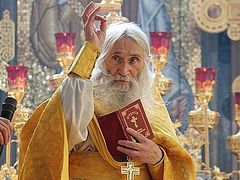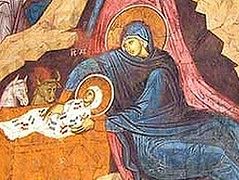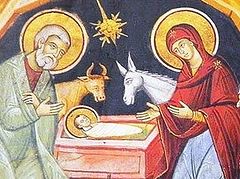Could Christ not have been born? It would seem a strange question. The pre-eternal counsel and revelation of the ancient prophets, the expectation of the nations, and the promise of the seed of the woman striking the head of the serpent—we are accustomed to these truths as to guiding stars in the heavens. But is God subject to fate? Did destiny really weigh upon the incarnation of the Son of God or unchanging fate?
God is completely free—no one prevails upon Him, nothing can be imposed upon Him from without. Who hath directed the Spirit of the Lord, or being his counsellor hath taught him? With whom took he counsel, and who instructed him, and taught him in the path of judgment? (Is. 40:13-14). But He is in one mind, and who can turn Him? and what His soul desireth, even that He doeth (Job 23:13). God could have not created our world, not have been born on earth as a man, not have suffered for our sins and falls.
But it’s revealed to us in Sacred Scripture: God is love (1 Jn. 4:8). He is love unspeakable, all-pervading, sacrificial. Think of a loved one who loved you boundlessly in a human way, who warmed you with but a look, who would do anything for you—even such love is but a pale shadow of the love of God. The purest human love, altruistic and self-sacrificing is but a weak reflection of the love of God, the ineffable love of the ineffable One.
But could genuine love have remained unembodied?
True love is not passive, not focused on itself, is ever directed towards the other, and is necessarily expressed in some way. If you sit at home, closed off from everyone, thinking you love everyone, then you are deeply mistaken. That’s not love but egotistical complacency, self-love. Love will give you no rest until you help those whom you love. Love is necessarily embodied in certain actions for the sake of your loved one: sacrificing your time, strength, or even just giving flowers. Genuine love cannot be theoretical; it is necessarily embodied.
One ascetic of piety told a story about his childhood: He was very sick, even to the point of the threat of death, and his mother, worrying, from her whole heart said to his father: “I’m ready to give myself over to lacerations if only he would recover.” Such love is genuine and sacrificial, when you’re ready to accept the fate of someone you love, to give your health, well-being, and your very life, expecting nothing in return—if only to save someone who is perishing. St. Basil the Great once uttered such amazing words: “Love has two remarkable properties: To grieve and suffer that your beloved endures harm, and to rejoice and labor for his benefit.” Such love exists in man only according to the image of God’s love. The Holy Fathers compare Divine love with an overflowing cup. Such love knows no bounds and limits and therefore flows over the edge.
The highest love is sacrificial, when you’re ready to take upon yourself the fate of one who is suffering, who is in trouble, when you are ready to bear his burden. God is love, and this love has been incarnated. God-Love incarnated, in the literal sense of the word, taking on human flesh. He, for the sake of man, Himself became man.
In this consists the main mystery of Christianity.
The omniscient and omnipotent One becomes a babe, at first only tearful and babbling, passing through all the stages of human growth. He Who contains the entire world in His Divine right hand lies in a manger and is swaddled in simple poor cloths, is taken into His Mother’s arms, and is in need of her warm care. He Who is ineffable in His Divinity participates as a man in the taking of the census.
There is a paradox and antinomy in this: The boundless, unlimited, eternal and omnipotent God becomes a tiny babe Who is lulled in the arms of His mother. He Who exceeds everything in this world and is therefore in need of nothing becomes like all men with the same needs, requirements, hunger, thirst, and the need to replenish his strength.
He does this in order to take upon Himself everything that we bear, to become like us, bearing the same burden, and, in fact, to forever free us from this burden of sorrow. St. John Chrysostom hymned the mystery of the Incarnation with these words: “The love of the Son of God has descended from Heaven to us on earth. By love, the bodiless One is embodied, the beginningless One begins, the Son of God is made the Son of Man; all the works of salvation are arranged by love: Death is abolished, the devil is overthrown, Adam is returned to Paradise, Eve is set free; love united the angels and men into one flock, love allowed for the testament, opened Paradise, elucidated life, and promised the Kingdom of Heaven.”
People suffer because of their sins, but the sinless One is incarnated, Goodness itself is incarnated to redeem us from our sins and grant us eternal goodness. People die and are terribly afraid of it, but to us, in the valley of the shadow of death (Ps. 22:4), comes Life itself, to unite us with eternal life. People suffer, having no love, but God-Love Himself was incarnate that we would be filled with the light of true Love.
To love is to be compassionate, and to be compassionate is possible only in becoming a participant in the suffering of the person you love. God took on flesh in order to suffer together with us and for us. He Himself bore our sins in His body on the tree, so we, delivered from sins, might live for truth: By Whose stripes you are healed (1 Pt. 2:24). If for our sake God became a man as one of us, entered into our history and suffered for us, then can we really think that He will ever leave us in our sorrows? Having been incarnate, the omnipotent God shared all our burdens with us, and then shares with us the boundless expanses of Heaven.
Genuine love cannot not be incarnated, but is incarnate.
If God is love, then Christ is love incarnate.




